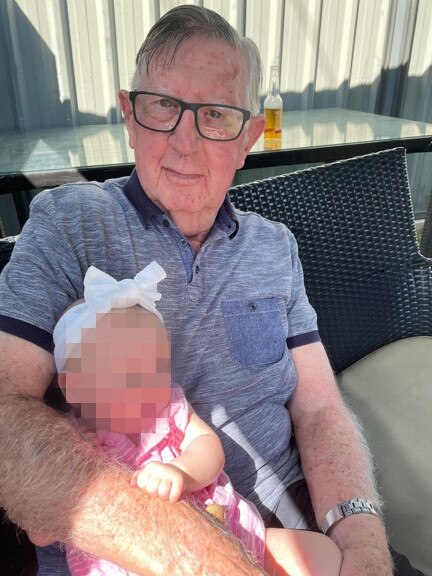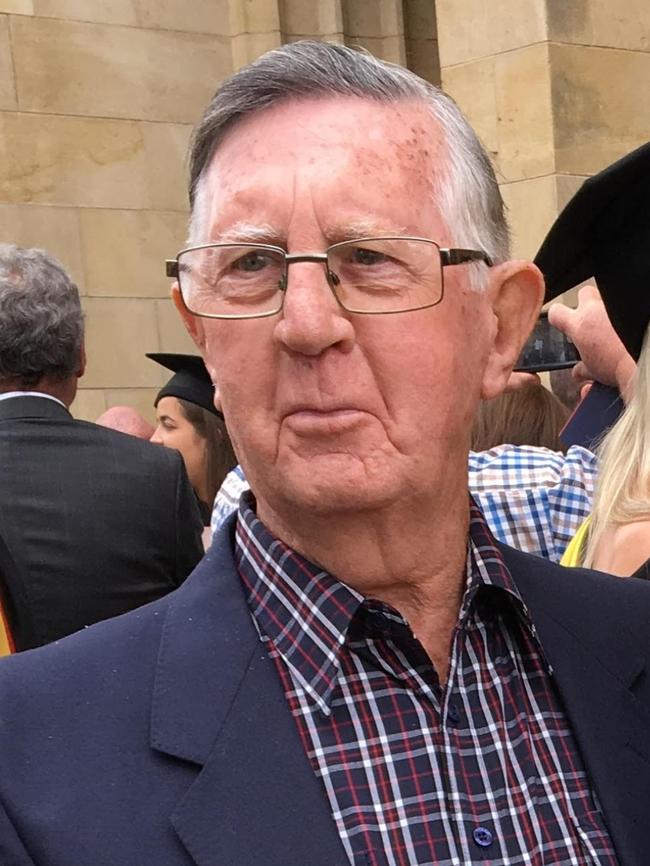Elderly man Bernard Anthony Skeffington choked on vomit while ramped in ambulance outside the RAH
A paramedic has told an inquest of her desperate fight to save an elderly man vomiting out his nostrils while ramped at the RAH. Warning: Graphic
SA News
Don't miss out on the headlines from SA News. Followed categories will be added to My News.
A paramedic treating an elderly patient who choked on his own vomit while ramped banged on the windows of her ambulance in a desperate attempt to save him, an inquest has heard.
Stacey White – a paramedic who treated 89-year-old Bernard Anthony Skeffington as he waited nearly two hours at the RAH, dying four days later – became upset on Monday as she gave evidence at an inquest into his death.
Ms White said, after her partner went to go and get help from inside the Royal Adelaide Hospital, Mr Skeffington started to “vomit a bit” before it turned into “an explosive vomit”.
“It was clear to us he required urgent assistance,” she said.
The inquest, investigating the deaths of Mr Skeffington as well as Anna Vincenza Panella, 76, and Graham Henry Jessett, 64, started last week where it was revealed they all suffered medical complications after being ramped for extended periods of time.
Ms White said Mr Skeffington started to vomit “a little bit” into a sick bag.
“I started to say that might make you feel a little bit better in an attempt to comfort him but I didn’t even get to finish the sentence before Mr Skeffington had what I can only describe as an explosive vomit,” she said.
“He vomited out of both nostrils and his mouth. The colour suggested a faecal vomit, which is indication of a serious acute condition. There was a high risk Mr Skeffington might aspirate.
“My main thought was to do everything I could to keep his airway open. I felt completely powerless.”
Ms White said Mr Skeffington was vomiting for between 30 seconds to one minute – during which she was unable to reach her radio and started banging on the ambulance windows in an attempt to get the attention of other paramedics.
“I did everything I possibly could,” she said.

Mr Skeffington’s son, daughter-in-law and granddaughter were visibly upset as Ms White detailed the incident.
Jenese Heywood, the triage nurse who treated Ms Panella, said ramping is “one of the reasons I left”. “It’s an everyday stressful experience,” she said.
Ms White said she felt as if the triage nurses “brushed off” her concerns regarding Mr Skeffington.
“I obviously felt there was some aspect of concerns being brushed off,” she said.
“I don’t exactly know what was said … but it’s a general feeling.
“It does happen in the triage system sometimes.”
Ms White said the triage process can be challenging at times and can be difficult to get the balance right between advocating for a patient and not stepping on the triage nurses’ toes.
“(It) does sometimes need to happen … advocating for the patient and their condition,” she said.
“There’s definitely a balance of communication that is needed.”
Deputy State Coroner Ian White extended an invitation to Mr Skeffington’s son, who used to be a nurse, to provide two statements to the court.
Mr White said there was a standing offer for Mr Skeffington to provide a statement on behalf of the family detailing his father’s life and the short and long term impacts of his death.
He was also invited to provide an opinion of the evidence given his background as a nurse.
Opening the inquest into the three deaths, counsel assisting Darren Evans said the inquest would investigate why the patients were left waiting for extended periods in ambulance bays at respective hospitals.
Mr Skeffington was taken to the Royal Adelaide Hospital on September 25, 2021, after calling triple-0 and waiting three hours and 42 minutes.
Mr Evans previously told the court a total of three ambulances were dispatched before the one that reached him, with them all being called to jobs considered to be of a higher priority.

“He was taken into the emergency department at 4.01pm, one hour and 43 minutes after arriving at hospital,” he said.
Mr Skeffington was later taken to comfort care where he died on September 29, 2021 as a result of aspiration pneumonia secondary to small bowel obstruction.
Giving evidence last week, paramedic Darren McInerney who treated Ms Panella before she died in the Royal Adelaide Hospital, said ramping is the worst part of his job as a paramedic.
“The single worst part?” Mr Evans asked.
“Yeah.”
“Is it frustrating?”
“Yes, very much.”
“What makes it so frustrating?”
“I feel sorry for the patients who are ramped, the beds are uncomfortable.”
Mr Evans also previously told the court of Mr Jessett’s circumstances and how he was “ramped” for five hours.
Mr Jessett was a type 1 diabetic and suffering from chronic pulmonary obstructive disease.
“When he sat down, he collapsed onto the (hospital bed) and went into cardiac arrest, CPR commenced immediately,” Mr Evans said.
Mr Jessett was declared dead at 6pm.
The inquest continues.



